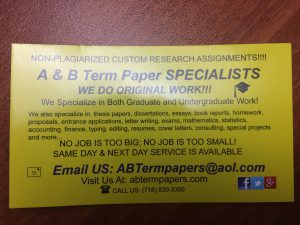As another semester gets under way, many City Tech students will find themselves under a tremendous amount of pressure – with family, work, and school obligations, finding time to write a successful paper might seem impossible to some. And that’s what the folks handing out these on campus are hoping to take advantage of:
As a professor who spends time designing and grading assignments with the goal of helping your students learn the course content, this kind of service probably makes you feel angry, frustrated, or depressed – if not all three at the same time. Even plagiarism detection programs can’t help you with paper writing services like this. You can try to get to know a student’s writing “voice,” but it’s still hard to deal with those who take advantage of these services.
But there are things you can do to make it much less likely that your students will turn to services like this. Remember that for many students, the pressure to succeed is very intense. English may not be their first language. They may not have been well prepared by their previous education to write college-level papers. They may not really want to cheat in this way, but they might not feel capable of writing a big term paper or project that has a lot riding on it. You can help address these issues by breaking down big, daunting assignments into smaller pieces – what we at WAC call “scaffolding” – that build toward the final paper or project. In this way, you make it harder for them to take advantage of paper-writing services, but more importantly, you make it feel less tempting to them.
Let’s say you’ve assigned a final paper or writing-based project that accounts for a large portion of your students’ grade. You can scaffold that assignment by designing shorter assignments throughout the semester that tackle and help demystify pieces of that final project. This could include assignments on brainstorming and writing a strong thesis statement, building a literature review, or compiling and evaluating data or evidence. Students are much less likely to plagiarize on these smaller assignments – particularly if you do some of them in class – and by the time the final project comes around, they’ll discover it’s more than half written already and doesn’t need the help of a service like the one offered above. They’ve also built the knowledge and confidence that will hopefully help them tackle bigger projects with confidence in future classes.
If you’d like more ideas on how to do this, come to some WAC workshops this semester! Next Tuesday (9/13) we’ll be presenting an overview on Designing Effective Assignments that will touch on these issues; then on October 18 we’ll be doing an entire workshop on preventing plagiarism. We’ll round out the semester with a workshop on Effective Grading and Minimal Marking (11/15) and the Creative Classroom (12/6). And if you can’t wait for a workshop, you can check out the PowerPoints and handouts from previous workshops last year that we’ve posted online: https://openlab.citytech.cuny.edu/writingacrossthecurriculum/workshops/
(Our complete Fall workshop schedule with times and locations will be posted on that page as well.)
Best of luck this semester, and we hope to see you at a workshop!





